Prisoners of War
Daily Life
Camp environment
POW camps tended to be rather bleak places. They could not, for security reasons, have trees and other greenery growing in them although many prisoners did receive seed from the YMCA in Geneva and plant their own vegetable and flower gardens.

POW camps tended to be rather bleak places. This is Stalag XB Sandbostel which was situated near Bremen in Germany.
Alexander Turnbull Library, War History Collection, DA 10609
Morning parade
The length and number of parades—or roll calls—depended on the country in which the POW camp was situated and on the person who ran the camp. It also depended on whether or not there had been any escapes from the camp; if numbers did not add up then the men could be kept on parade for a very long time.
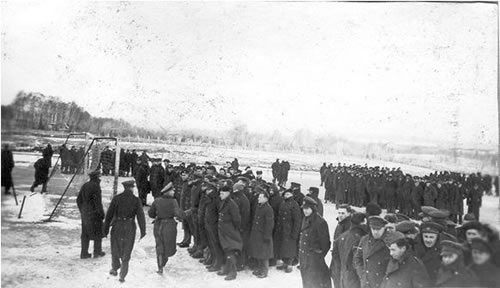
Morning parade at Stalag VIIIA which was situated near Görlitz in Germany. This photograph was taken by a POW using a hidden camera.
Jack Smallridge collection
Identity cards
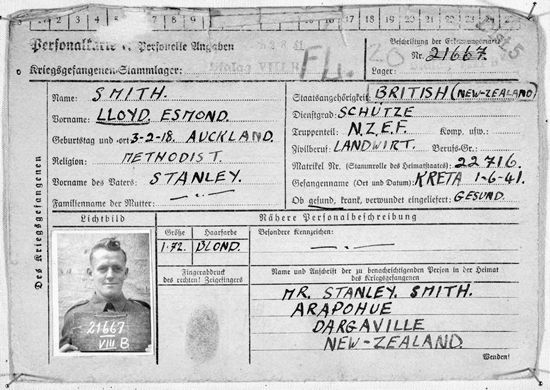
This is an example of the card the Germans used to record a POWs personal details. As you can see, Lloyd Smith was taken prisoner on Crete on 1 June 1941.
Alexander Turnbull Library, War History Collection, DA 7226
Filling in time
At some camps, provided they gave their word that they would not try to escape, POWs were allowed walks under guard outside the wire.
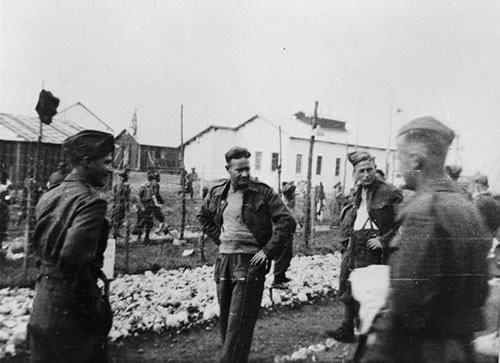
At a camp in Italy POWs walk to fill in the time. Note the wire separating these men from prisoners of other nationalities behind
Alexander Turnbull Library, War History Collection, DA 11306
Roman holiday
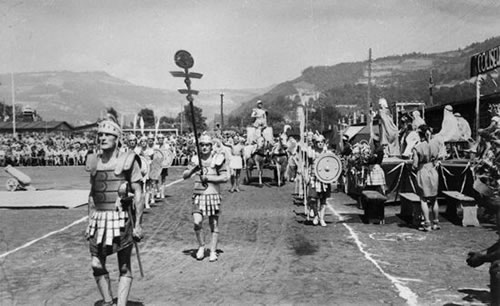
Prisoners of war took any opportunity to fill in the long hours of incarceration. Here POWs at Stalag XVIIIA parade in costumes made from recycled material from Red Cross parcels in a 'carnival' called Roman Holiday
Alexander Turnbull Library, Wellington, New Zealand, Reference: War History Collection DA 10384
At the races
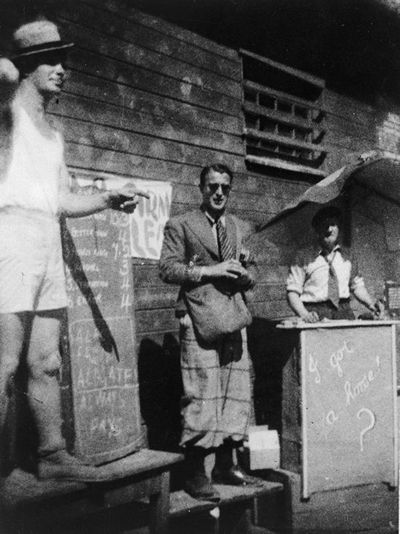
POWs at Stalag XVIIIA take part in a mock race day. These men are acting as bookies, dressed in rather exotic clothes. Stalag XVIIIA was situated at Wolfsberg in Austria.
Alexander Turnbull Library, War History Collection, DA 10406
Sport
When they were fit enough, in other words when the Red Cross food parcels were in regular supply and they had enough to eat, POWs enjoyed participating in many different sports. There were inter-country rugby matches, for example, but most sports were played at one time or another.
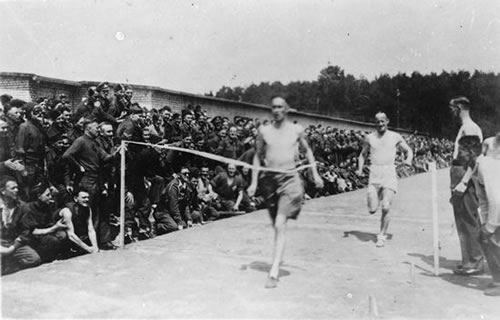
POWs take part in a sports meeting at Stalag VIIIB at Lamsdorf, near Teschen in Germany.
Alexander Turnbull Library, War History Collection, DA 10725
Camp library
Many prison camps built up large libraries of books, thanks in part to the YMCA in Geneva which sent parcels of books (and other recreational equipment) to POWs. Many took the opportunity to study—degrees, for example, were available through the University of London.
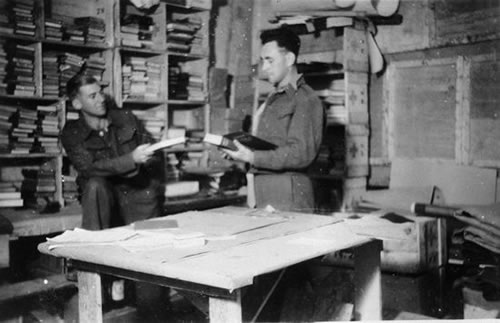
Two POWs in the library at Stalag VIIIA, near Görlitz in Germany.
Alexander Turnbull Library, War History Collection, DA 10621
Food parcels
Because there was so little of it, food played a very important part in a POW’s life. The International Committee of the Red Cross in Geneva provided food parcels to POWs from those countries which were signatories to the 1929 Geneva Convention. Here men at Stalag 383 prepare their lunch using food from parcels. [Related interview]
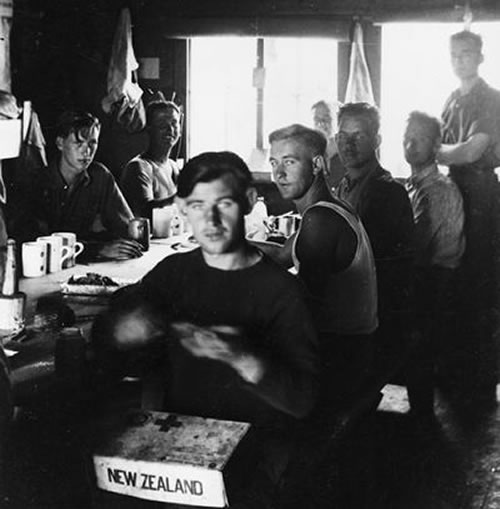
The International Committee of the Red Cross in Geneva provided food parcels to POWs from those countries which were signatories to the 1929 Geneva Convention. Here men at Stalag 383 at Hohenfels in Germany prepare their lunch using food from parcels.
Alexander Turnbull Library, War History Collection, DA 3705
Mess time
POWs at Campo PG57 in Italy line up for food. It is being cooked on a prototype of the blower, a nifty invention made out of items recycled from Red Cross food parcels which POWs used to heat up and cook food. [Related interview and Camp Cooking article ]

POWs at Campo PG57 near Gruppignano in Italy line up for food
Alexander Turnbull Library, War History Collection, DA 11310
Working parties
If POWs were not officers or NCOs, it was likely that they would be sent out to work on what was called in Germany, an arbeitskommando. POWs in Italian POW camps also worked, as did those who were prisoners of the Japanese, most notoriously on the Burma Railway. Conditions for workers in Japanese POW camps were extremely bad and many people died as a result of the inhumane treatment.
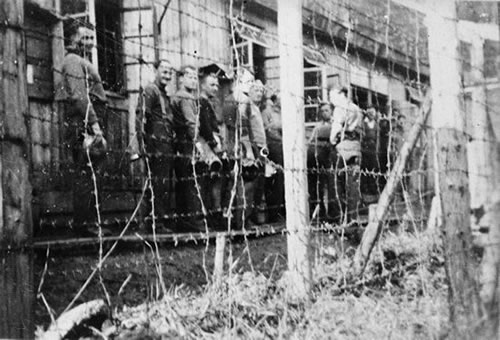
POWs on an arbeitskommando in Austria queue for their midday soup.
Alexander Turnbull Library, War History Collection DA 3774
Secret radios
Being on a working party meant that POWs could often get information about the outside world and the course of the war from civilians with whom they worked. While in camp, however, they relied on secret radios for news, particularly from the BBC in London. Men would listen to the radio and then be responsible for going from hut to hut in the camp and letting their fellow POWs know the latest news. [Related interview]
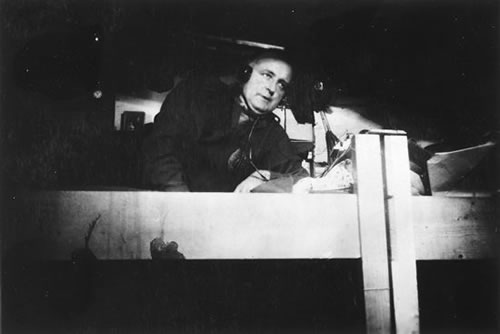
A man lies on his bunk in a hut, listening to a secret radio at Stalag 383, near Hohenfels in Germany.
Alexander Turnbull Library, War History Collection, DA 12389
Permission of the Alexander Turnbull Library, National Library of New Zealand, Te Puna Matauranga o Aotearoa, must be obtained before any re-use of the images on this page.
Next: Forced Marches >